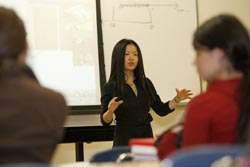Teaching assistants overcome cultural, language barriers
 Photo by Joseph V. Labolito/Temple University
International teaching assistant Dan Zhang (center) shares her expertise in the field of marketing practices in China with her “International Marketing” class. Zhang’s involvement in the International Teaching Assistants program improved her ability to communicate those ideas to her students.
|
When Dan Zhang first arrived in the United States to pursue a doctorate in marketing, she faced a host of challenges. As a graduate student from a small city in China, who does not speak English as a native language, she had not only to adjust to living in an unknown land, but also to take on the responsibility of teaching in a non-native language.
Recognizing the difficulties Zhang and many other international graduate students face, Temple offers a program to aid all TAs who are not native English speakers in their adjustment to life at an American university. The International Teaching Assistants program supports the university’s commitment to teaching excellence by introducing the assistants to the linguistic and cultural diversity found on Temple’s campus. |
|
Jean Alderman, a graduate extern for the program, said the primary mission of the ITA program is to foster a learning environment where undergraduate students can benefit from interaction with international teaching assistants, and vice versa. “Hopefully, the undergraduates can also learn something from the teaching assistants about their native customs and culture,” she said. “The first way to make that possible is to give the assistants the linguistic skills they need in order to communicate in the classroom.” All international teaching assistants must pass an oral English competence exam. Those who don’t are required to enroll in a course designed to bolster their linguistic skills so they can take on the responsibility of teaching. This fall, the ITA program launched two new initiatives to make the transition from student to teacher a more positive experience. The Conversation-Partner Program uses undergraduate students as language consultants, who provide critical feedback that the teaching assistants can use to improve their teaching skills. To encourage networking among TAs, an ITA luncheon has been set up to encourage interaction among assistants to help them share their experiences with each other. “Many of our teaching assistants know other assistants in their departments, but they might not know if another assistant from their own country is teaching in another department,” ITA graduate extern Mariele Flores said. The success of the ITA program can be seen in many classrooms across the university. A shining example of the program’s ability to prepare teaching assistants for the challenges they face is found in Zhang. “I went through the course that ITA offers and came out of it knowing more about American students,” she said. “Temple’s student population is very diverse, and I’m glad that I get to experience it.” Teaching a course concentrating on international marketing, Zhang has found it useful to have her own experience in a foreign environment to illustrate the importance of understanding foreign countries and cultures in today’s global marketplace. She also said she appreciates learning the skills she needs to clearly convey her message to Temple students. — Written by Karen Shuey |
|